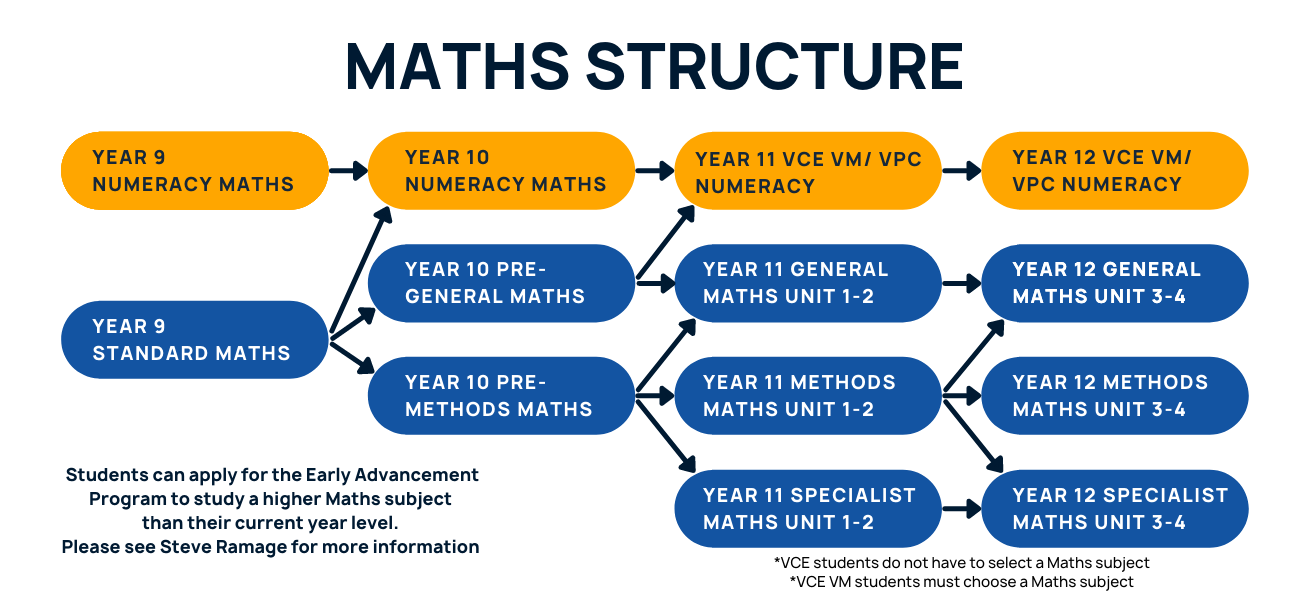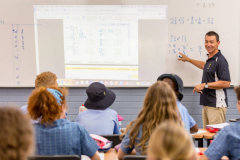MATHEMATICS DOMAIN
Steve Ramage
Mathematics Instructional Leader
In the Mathematics Domain, we look to develop your mathematical and literacy skills for everyday life, work and assist you in becoming active and critical citizens in a technological world. You learn to see connections and apply mathematical concepts, skills and processes to pose and solve mathematical problems in a range of contexts. As you progress through your mathematical studies you are able to follow a pathway which is more suited to your needs, aspirations and interests.

General Mathematics 3-4

- Study univariate data, bivariate data, financial modelling, networks and matrices
- Incorporates a practical approach that equips students with essential skills as future citizens
- Suits a student that is not interested in Algebra
Subject Code: V2MGM
Year Level: 12
Unit 3 & 4
We complete the core section of the unit. This includes the study of univariate data, bivariate data, recursion and financial modelling and time series.
During the rest of the year you complete two of six optional units offered.
These units are:
Networks (directed and undirected graphs, shortest path, critical path analysis and job allocation).
Matrices (matrix representation of discrete data, matrix arithmetic, solution of simultaneous linear equations for the analysis of problems in practical situations and the calculation of steady state).
The CAS calculator is an essential tool throughout the year, particularly in the core section of the course.
What does this mean for me?
General Mathematics is not the ‘easy option’.
You need to apply yourself and complete all set tasks. You apply your skills with the aid of a CAS calculator. You compile a Rules book which is used in both end of year exams.
Assessment
- Course work
- Two modelling or problem-solving tasks
- One application SAC
- Two end of year exams. Exam 1 is multiple choice and Exam 2 is short answer. Calculators and Rules books are allowed in each exam
What sort of student would like General Mathematics?
Someone who:
- Is interested in Maths and who wishes to undertake further study which may have a Mathematics pre-requisite. Many university courses use the data analysis concepts
- Who is not interested in Algebra.
Pre-Requisites
General Mathematics Unit 1 and 2 or Mathematical Methods Unit 1 and 2.
VCE VM Numeracy 3-4

- Enhance your numeracy skills to make sense of your personal, public, and vocational lives
- Practice your maths skills in everyday ‘real world’ contexts
- Explore personal, civic, financial, health, vocational, and recreational numeracies
Subject Code: V4MNU
Year Level: 12
Unit 3
- You will look at Number, Shape, Relationships, and Quantity and Measures
- Use your existing numeracy skills in more specialised contexts
- Directly build on your skills and knowledge from Units 1-2 Numeracy
Unit 4
- You will look at Dimension and Direction, Data, Uncertainty, Systematic
- Utilize the numeracy problem-solving cycle to identify, use and reflect on mathematical learning
- Use a variety of numeracy tools and technologies
Assessment
- Will be based on your ability not only to do the maths, but to apply it in practical ways
- May include investigations, projects, presentations, and portfolios
VCE VM students can undertake VCE Maths as an alternative to this subject (with approval from the Mathematicss Instructional Leader).
